The Myth of "Who's Your Daddy?"
or, "Strange Women Lying in Ponds Distributing Swords is No Basis For a System of Government. "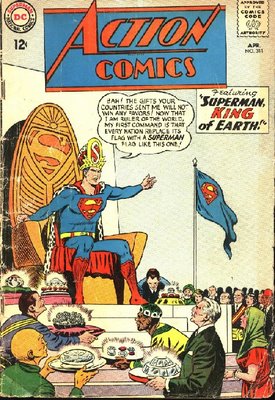 Once again, what started as a response to Matthew has grown into an entire blog post (including a little anti-Bush rhetoric and, to my surprise, praise for Infinite Crisis). In response to my last post that Superman was in fact a working class hero and his stories are anti-classist, he wrote
Once again, what started as a response to Matthew has grown into an entire blog post (including a little anti-Bush rhetoric and, to my surprise, praise for Infinite Crisis). In response to my last post that Superman was in fact a working class hero and his stories are anti-classist, he wrote
Everything you say about Superman is true. But you're talking about what Superman does, and what he thinks and believes and stuff. What I was talking about is who he technically is, and who he is is, basically, the Lost Prince of Krypton. He's like Carrot in the Discworld books.I meant to respond right away, but I couldn't tell whether our disagreement over the class of Superman was a minor semantic disagreement over the definition of the word "is" (which would be too minor to even argue) or a major philosophical one over the meaning of social class and the nature of hereditary predestination. I'm going to assume it's the second, even though there is no way to do that justice in one post of my comics blog.
This way, the Superman writers get to have it both ways. They can draw from the alien-aristocrat superhero archetype, but they don't have to make him act like it. (Contrast: Superman, and Dr. Tachyon from the Wild Cards novels.) This may actually be one reason (out of all the many reasons) why Superman is such a great character.
Matthew says that Superman, in the tradition of Oedipus, King Arthur, and Aquaman, may act as a peasant hero but he is in fact a king-in-disguise, that it is his Kryptonian genetic destiny shining through that makes him Superman. That he's a hero because of his elite genetics, no matter how much he pretends he is a commoner.
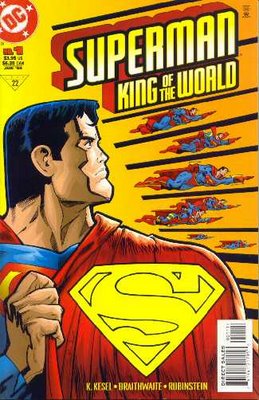 My problem with basing Superman's class on his genetics over his actions is that class is a social construct. It is only through what he and others consider him to be that we know what class he belongs to. And Superman chooses NOT to be a king (stories where Superman chooses to become a king will be ignored because they are terrible) The myth of aristocracy is that class is genetic, that some people are just born good enough to rule, and that this inherent goodness can be passed down from generation to generation (like the X-Gene!)
My problem with basing Superman's class on his genetics over his actions is that class is a social construct. It is only through what he and others consider him to be that we know what class he belongs to. And Superman chooses NOT to be a king (stories where Superman chooses to become a king will be ignored because they are terrible) The myth of aristocracy is that class is genetic, that some people are just born good enough to rule, and that this inherent goodness can be passed down from generation to generation (like the X-Gene!)And Superman's own story proves the myth false. Yes, Clark's blood obviously gives him "powers and abilities far beyond those of mortal men." However, what makes him a good guy can't be his blood, because Kryptonians are the assholes of SPAAAACE (below the comic).
Zod, Preus, the Eradicator, the new Kara Zor-El (possibly)... Those that come to Earth preaching the superiority of Krypton are by and large really, really bad guys. And even under the best of circumstances, Kryptonian society was ruled by arrogant morons who couldn't see their planet was falling apart despite the evidence of the best scientists of the time (cue Global Warming joke). So clearly, just being vulnerable to kryptonite isn't enough to make you better than the masses.
No, what makes Superman a hero is the choices he makes. And whenever Superman is forced to choose between the Kryptonian way and the Earth way, he chooses Earth, every time, and embraces his life as Clark Kent (the end of Kingdom Come, for example). And as long as Superman chooses to live as a middle-class employee, THAT is who he is. Jor-El and Lara may have given him powers, but it's Jonathan and Martha, his "humble" lower class parents, who made him a hero.
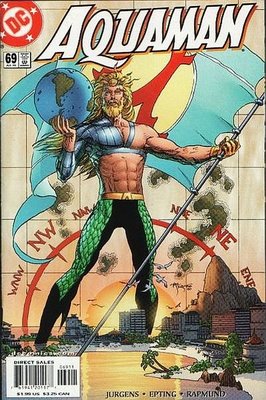 This is unlike almost every other superhero, by the way. Contrast Superman with Aquaman, for example. Like Superman, he was orphaned as a baby, raised in an alien world, and grew up as a human for at least part of his life (where he learned English and was christened Arthur Curry). But when Aquaman learned where he was really from, he rejected the surface world and threw in his loyalties to Atlantis whole-heartedly, in the more traditional Arthurian arch-type. (Ironically, to become King Arthur, he had to reject the name "Arthur.") Even given the chance, Superman would NEVER give up Earth to return to Krypton.
This is unlike almost every other superhero, by the way. Contrast Superman with Aquaman, for example. Like Superman, he was orphaned as a baby, raised in an alien world, and grew up as a human for at least part of his life (where he learned English and was christened Arthur Curry). But when Aquaman learned where he was really from, he rejected the surface world and threw in his loyalties to Atlantis whole-heartedly, in the more traditional Arthurian arch-type. (Ironically, to become King Arthur, he had to reject the name "Arthur.") Even given the chance, Superman would NEVER give up Earth to return to Krypton. Matthew brings up Carrot Ironfoundersson of the Discworld novels, another heroic king-in-disguise who refuses to take the throne. But that, I think, argues for MY point. Discworld, after all, is a satire of the myth of aristocracy (among many other things). Most of the other characters think Carrot should rule because of his unacknowledged heritage, but those that think that way are idiots and bad guys.
Matthew brings up Carrot Ironfoundersson of the Discworld novels, another heroic king-in-disguise who refuses to take the throne. But that, I think, argues for MY point. Discworld, after all, is a satire of the myth of aristocracy (among many other things). Most of the other characters think Carrot should rule because of his unacknowledged heritage, but those that think that way are idiots and bad guys.The smarter characters, including Carrot himself, know he's not smart enough to run the city, nor ruthless enough to do half the horrible things he'd need to as King (or Patrician, as the position is called). That having the right name and the right daddy isn't enough, that "the right blood" is in fact close to meaningless (I'd make another joke here...). Carrot may be related to a king, but day to day it's much more important that he learned how to be good man (or dwarf, it's complicated) and can throw a strong right hook.
Carrot, of course, is a deliberate satire, and I doubt Siegel and Shuster were thinking too deeply about Jungian arch-types and Marxist rhetoric when they created their science fiction strong man, but I think Superman is a stronger character because of it. Carrot can really only be that satire: "King Arthur, but not," stuck in an old debate over the divine right of kings and dictators. Superman can be that satire and more, moving beyond that class discussion to a classless society where a man is judged only by his actions.
Which leads me to my defense of Infinite Crisis. I dropped Civil War when I realized it wasn't about anything. And while Infinite Crisis was flawed, I can tell you what it was about: the myth of heroic destiny. Superboy-Prime (and to some extent Alexander Luthor) believed he had the right, the duty, to destroy the universe and remake it in his image because of who his Kryptonian parents were, and that he would ALWAYS be in the right, always be the hero because his name was Kal-El, he was from Krypton, and he had great power. He was wrong. In the end it came down to Superman, our Superman, laying it out for him:
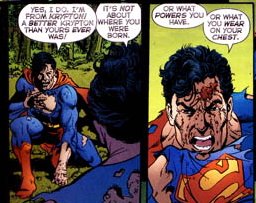
And, after laying Prime out, Clark lets him know what it's all about:
What makes Clark Kent "Superman," and not just another asshole Kryptonian, is his actions. So when judging what class Superman belongs to, whether he's an elite looking down on the masses or one of us, we can only judge him based on "what Superman does, and what he thinks and believes and stuff." Because what else is Superman, in the end, other than those things?

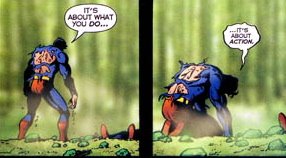
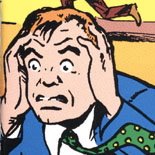

12 comments:
What a great post. Again I have to say that we really don't disagree much, if at all.
You say:
I meant to respond right away, but I couldn't tell whether our disagreement over the class of Superman was a minor semantic disagreement over the definition of the word "is" (which would be too minor to even argue) or a major philosophical one over the meaning of social class and the nature of hereditary predestination. I'm going to assume it's the second, even though there is no way to do that justice in one post of my comics blog.
Matthew says that Superman, in the tradition of Oedipus, King Arthur, and Aquaman, may act as a peasant hero but he is in fact a king-in-disguise, that it is his Kryptonian genetic destiny shining through that makes him Superman. That he's a hero because of his elite genetics, no matter how much he pretends he is a commoner.
Actually all I was trying to get at is that I was listing all the superheroes I could who had origins that were a) alien and b) upper-upper-class. And Superman does. And since Superman is the most important superhero, I was pleased to be able to put him on a list that supported the point of my article.
I don't claim that it was this aspect of his origin that made him a great hero. I agree with you that it was the Kents. My favourite take on Superman is the Elliot S! Maggin take, especially as portrayed in the novel Miracle Monday. It's Ma and Pa Kent all the way. Well, that and Kal-El/Clark himself; his choice of goodness, truth and justice was certainly a conscious and sincere one.
It's not important to the point of any of our three articles on this, but I think you've slightly misread Carrot. I'll agree with most of what you said, but:
The smarter characters, including Carrot himself, know he's not smart enough to run the city, nor ruthless enough to do half the horrible things he'd need to as King (or Patrician, as the position is called).
just isn't true. Carrot is absolutely smart enough, although he's careful to hide the fact, and he's also ruthless enough... except that he doesn't want to be that person. He wants to be the person he's acting like he is, and so he is that person (because he has the simplicity of character that allows this). Part of it is his down-to-earth dwarven upbringing, part of it is the civic and political lessons he's learned from Vimes and Vetinari, part of it is his genuine affection for Colon and Nobbs and Detritus and even the likes of Here'n'Now and C.M.O.T. Dibbler, part of it is that he doesn't want to choose a side that would put him against people he respects, like Vimes and Vetinari and, I suspect, Angua (I mean, I know he respects her; I'm just not sure which side she'd be on). I'm not suggesting that Carrot has a dark side. He doesn't, because he doesn't want one. He doesn't want any part of all that stuff. (Contrast him with Granny Weatherwax, who definitely has a dark side, which is still present, but was defeated for good many years ago. She doesn't have that simplicity of character.) Which I think is also true of Superman.
Sure, Superman/Clark chooses to live partly the life of a newspaper reporter, working in an office and renting an apartment, but he is so much more than this that discussions of his class-trappings as Clark Kent are almost moot. Ditto aspects of his class origins.
What is more interesting is the narrative use to which the character is put. What kind of message do Superman comics ultimately send and deliver about individual human accomplishments, heroism, community, political action, and class?
More here: http://frequential.blogspot.com/2006/09/class-conflicts.html
Matthew: man, if this were a Discworld blog, we could be here all day. The short of it is, Carrot is super smart and potentially super ruthless, BUT compared to Vetinari, Carrot isn't smart or ruthless enough to run Ankh-Moorpark. Not yet.
The book Pratchet is building to, whether he knows it or not, is what happens when Vetinari dies, and they have to find someone new to replace him. The public will rush to put Carrot in the hot seat. Will the City Watch let them?
Bryan: Don't go onto other people's blogs and dismiss what they wrote as moot. Disagree, agree, correct, clarify. Don't dismiss. It's insulting.
Well, nobody's as cunning or ruthless as Vetinari. Let's not get silly here.
You may be right that that's the book Pratchett is building towards... but I think the ending of that book is that Vimes becomes the new Patrician, completely against his own wishes. I think Vetinari has those wheels in motion right now and I think the idea would have Carrot's 100% support.
It also occurred to me to mention that what I said about Granny Weatherwax in my earlier comment may also be true about Batman.
(As long as we're mapping major Discworld characters to major comic-book superheroes, I'll fill in the third corner of the square by suggesting Rincewind ~ Spider-Man. Not sure who Death would be. Silver Surfer?)
One other relevant notion. Much is often made at the Absorbascon and other sites about how one of DC's themes is that of legacy and heroic dynasties and so on. This may be one reason the upper-class-superhero thing is stronger in DC comics as opposed to Marvel.
Don't go onto other people's blogs and dismiss what they wrote as moot. Disagree, agree, correct, clarify. Don't dismiss. It's insulting.
Heh, well I did say "almost."
Okay, I'll try to moot this around a bit. To take one of your points, the early Siegel & Shuster Superman as (godlike) friend of the working class miner: I think that rather than being proof of some sort of proto-revolutionary class solidarity on the part of Superman's character, the lesson being taught to the mine owners is more an expression of the half-formed, mainstream liberalism that the character (and Siegel) embodies. These sorts of class-based demonstrations soon fall by the wayside in the comics (moreso after Siegel is fired from the feature), in favour of more predictable law-and-order type escapades alternating with humour and fantasy epsiodes, and the character becomes much less pugnacious and identifies much more with the status quo, coming to stand for a sort of super-hegemonic normalcy. Especially in his early years, Superman more often fights the working class (in the form of common thieves and crimes against property) than actively helps it. With the exception of one or two stories that allude to strikes at the Daily Planet, etc, there are very few examples of Superman/Kent participating as an equal in the struggles of the common man (he can't, almost by definition). Even when he visits the Bottle City of Kandor he finds it impossible to resist driving around as a masked vigilante, beating people up.
Anyway, I've enjoyed reading your thoughts on this issue of class in superhero comics. Thanks for the long interesting posts!
Matthew: It'd be hard to map Rincewind to any hero because he's such an intentional skewering of the heroic ideal. Given the choice between saving others and saving himself, Rincewind saves himself, every time. The only reason he keeps saving the world is because it'd be suicide not to. If anything he's Arthur from the Tick, or Ambush Bug.
The Spider-Man of Discworld (and there's a sentence on par with Kryptonite Lightsaber), I think, is Vimes, the hard-luck hero who always does the right thing, no matter how much he hates it, and is smarter, tougher and braver than anyone, including himself, really realizes.
In a similar vein, Captain Carrot acts a lot more like Captain America than any other superhero. Someone whose patriotism and sincerity are easy to mistake for naiveté and stupidity and hide a cunning mind.
Granny Weatherwax as Batman works, especially when you add in Ogg as Catwoman and Magrat as Robin.
Death is another hard one to map. Of all characters, he's closest to Morpheus, though that's hardly surprising and probably doesn't count. He's certainly nothing like Death.
Vimes as the future Patrician? Probably. Though if Vetinari is really smart, he'll put the Librarian in charge.
And superhero dynasties are not unique to DC. How many Captain Americas have there been? How many Spider characters? VENOM, of all characters, had his own dynasty in the 90s.
Bryan: I don't understand your point.
This is sort of incidental, but why has no writer since (AFAIK) gone back to the whole radical progressive Superman image? I mean, I can see why DC wants that as the main image of the character, being part of a big soulless corporation themselves, but as far back as the Eighties they've allowed alternative interpretations of their icons. So why hasn't Alan Moore or Grant Morrison or Frank Miller (who spends a good portion of DKR harping on Superman's blind obedience to the US government) done the back-to-basics approach? Why do they always write him as the Boy Scout?
Evan: First off, I will not condone that canard about "soulless corporations" suppressing radical propaganda and imagery. DC still produces Green Arrow and sells tons of copies of V for Vendetta every year. As long as they can sell it, they'll produce it. (cynical, but true)
Which kind of answers why he's not a "radical progressive" anymore: no one is buying that. Let's face it, that kind of firebrand class rhetoric worked a lot better in 1938 than it does today. Even Green Arrow's hippy-infused liberalism is getting kind of old.
Which isn't to say he isn't still fighting a capitalist power structure that places a lot of power in the hands of a few "elites". I mean, Wolfman and Byrne made Lex Flippin' Luthor a CEO of a "big soulless corporation." What do you think THAT says about who the bad guys are in modern America?
Superman may not be burying him alive, dropping him off buildings, or forcing him to fight his nearest competitor to beat him, but he's still fighting him, with his keyboard or his super-strength, but he's still fighting him on behalf of all the wage-slaves like himself. Just because he isn't leading the picket line doesn't mean he isn't active.
And some writers HAVE, occasionally, dipped back into the more radical interpretation of Superman, usually in Elseworlds that can place him in a time or setting where it makes a little more sense, but Joe Casey had radical Superman fighting "our" Superman in a relatively recent issue of Adventures of Superman with an awesome cover by Kevin Nowlan.
Well, "soulless corporation" is a bit of hyperbole. But Superman is a higher profile character than V or Green Arrow, and so there's still the whole "we need to sell lunchboxes" angle.
As for that breed of progressivism being dead, well, it's sort of, but there's still the basic allure of a guy going out and fixing the things that need fixing. Though he does fight Luthor-the-capitalist now, he tends to stick to the manifestly illegal "army of machine-gun robots" manifestations of Luthor's ambition. Like the other masked crimefighters he tends to deal with symptoms more than causes. (He does sometimes do things like stand up to third-world dictators and help African villages set up irrigation, but those are always two-page affairs before he goes off to fight Brainiac.)
It'd just be kinda neat to me if Superman went up to the fictionalized equivalent of Ken Lay's widow and made her cough up the money that her husband would've paid if he hadn't died after sentencing, or did the "unsafe mine" trick again (seeing as it's become an issue again.) Maybe just in an ALL-STAR run or something, but I think injecting a little "relevance" back into the character wouldn't hurt.
It just strikes me as weird that the character is so far gone from his original conception.
I wouldn't say vigilante progressivism is dead, just out of fashion (though if Banksy has anything to do with it, it might be making a comeback.)
I agree that a little more activism could do the Last Son of Krypton some good, but I can also see why writers would move away from it for reasons that have nothing to do with Superman Underoos.
The first is that "real world" villains would rarely have the ability to put Superman himself in jeopardy, and it's important to think that the hero MIGHT die. So here come the death ray wielding robots.
The second is that Superman became a lot more powerful over the years (probably from fighting all those robots), and as Superman moved from fighting toughs to fighting whole armies, his vigilantism would move from bullying to near-dictatorship.
For example, the Lay widow scenario. That's a great story. And I can imagine it being kind of fun for Batman or Green Arrow scaring her into turning over her ill gotten gains. Or having Lois or Clark even expose her in the Daily Planet (or threaten to if she didn't do the right thing). But having the guy who can burn her house down from space or crush her dog into a diamond force her to do the right things is, well, I wouldn't like that story.
Though this is still the best response to whether superheroes should fight more realistic crime.
Yes, and every time you esteem farmers as noble lower-class people my background screams middle-class profanities.
For goodness sake, owning between 80 and hundreds of acres of land, multiple vehicles including farm equipment, and actually being able to live off of it, make profit from it, are all components of not upper-class and not middle-class but lower-class is an idea which makes me instantly doubt every other idea or "understanding" that you throw out.
Wow, Chris, your comment is six months late, needlessly antagonistic, irrelevant to the post you commented on, and, wonderfully, entirely wrong.
Had you read the post, as opposed to looking for minor quibbles with which to cast doubt upon my every argument, you would have seen that I at no point "esteem farmers as noble lower-class people". In fact, I don't talk about "farmers" in general at all. I only talk about the Kents, two fictional characters.
You also might have picked up that I was talking about aristocracy, an out-dated system in which the upper class are the kings, dukes, and lords, and the "lower class" is, y'know, everybody else.
Furthermore, had you read the immediately previous post, that is actually about Superman's class in a modern setting, you would have read that I call the Kent farmhouse "lower middle class", a description that I feel is fairly consistent about their portrayal from Superman #1 through Superboy up till Smallville. While hardly destitute, the Kents live in a very small town, are often in debt, and have, as far as I can tell, only one tractor and it's constantly breaking down.
So Chris, to sum up, your inability to read, think, or write a comment that does not come off as incredibly dickish and ill-informed makes me doubt your every idea and "understanding". I'm glad we've come to this consensus, now go screw.
Post a Comment